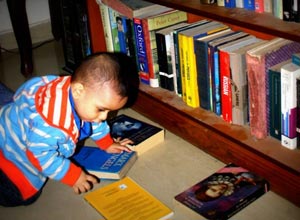Mini MBA for 7-year-olds? No kidding!
Ipsita Sarkar Gupta, Shiksha.com
How about having your 7-year-old give you tips on money management? It’s not some random thought. According to a news agency in China, rich families in Chengdu are sending young children to special training programmes, known as ‘mini MBA’, which teach children how to manage and understand money. The programme is open to children aged seven to 11.
This mini MBA has a two-year curriculum with classes being run for three-hours a week. The fee is a whopping 60,000 yuan (INR 5,27,000 approx). The course aims to improve the child’s financial quotient, i.e., the ability to understand and manage money.
The mini-MBA has sparked a debate in China – some opting for it, some against it. Taking a cue from this upcoming trend, we got some Indian parents and professors to share their take on the subject – Is mini-MBA, worth the trouble for young children? Can it inculcate financial and management values in the little ones?
“MBA for a seven-year-old kid is a strange idea. At this age, a kid needs a learning which is catered to by the K-12 schools. How could MBA education be a replacement for this,” asked a shocked Saurabh Shakya, Asst VP in a Noida-based online firm, and father of a 17-month-old Shreyansh.
Echoing similar views, Somapika Sarkar, a Mumbai-based NGO worker and mother of four-year-old Kush said, “MBA refers to business administration. What is the point of a management degree that will make little sense to Doremon viewers, where Nobita keeps getting zero in every subject. I will first inculcate the value of money in my child. Why take help of any external agency to introduce the basic principles? An MBA will make sense only after class 10th or when he has sufficient business understanding.”
Commenting on mini-MBAs in China, Yojana, news editor of a national daily and mother to 13-year old Dhananjay Yadav, is reminded of Amy Chua’s novel Battle Hymn of the Tiger Mother as she reflects on different parenting styles of Indians and Chinese. She says, “We Indians are not as strict as Chinese parents. Our generation has been through enough pushing around. We were forced to choose technical subjects despite different interests and leanings. I don’t think Indian parents today will be pushy.” She further added, “Children would never think of pursuing an MBA on their own. They want to become actors or sportsmen or other fancy things. However, every child has his or her own attitude. For teaching my son about the value of money and finances, I will ask him to save from his pocket money. At the end of the day, children learn a lot from adults. How you spent your time and money becomes the learning point for the little ones.”
Most parents Shiksha.com spoke to were not in sync with the idea of MBA for kids.
Sharing another perspective is education provider, Enma Popli, founder and CEO of KidSmart. Kidsmart offers programmes for young children, aged 8-12 years, which focus on inculcating etiquettes, and skills around team building, communication and so on.
According to Enma, “In India, adults as old as 30 to 40 years are being trained in areas of team building, social responsibility, and so on. These very adults told us they had to unlearn what they have learnt so far. Also, adults choose to learn what they want. Same is not the case with children. We focus on teaching good habits for life. So why not start early? Keeping these assumptions in mind, we created small modules on the lines of adult learning, role play and interaction.”
Kidsmart claims to have trained over 400 children so far and says that parents are quite enthusiastic about such management-oriented courses.
Professor Shahnkarsen Basu from the Indian Institute of Management – Bangalore (IIM-B), justifies these mini-MBAs whole-heartedly. He says, “Mini-MBAs are a very good suggestion, though it is not a new idea. About 16 or 17 states in the United States have made basic financial courses mandatory at certain levels. However, these courses are not gradable. An outcome of the 2008 financial crisis, these mini financial modules have been well received. It is a great idea and Indian parents should definitely try these.”
Questioning Indian parenting sensibilities, Professor Basu further adds, “Unfortunately, Indian parents tend to keep children in a sheltered atmosphere rather than exposing them to practical learning. If affordable, financial literacy must be ensured in every child. It is better to have a structured early learning rather than learning at a later stage in life.”
Comments
(2)
M
2013-04-11 12:50:23

